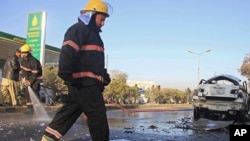Afghan authorities say a group of Taliban suicide bombers attacked a police academy in an eastern region Wednesday, shortly after insurgents killed six construction workers and a judge elsewhere in the strife-torn country.
Provincial police say security forces killed all the three bombers who launched a “coordinated” attack on the police academy in Khost province bordering Pakistan. The gunfight also wounded several Afghan security personnel.
The violence happened hours after Afghan police said Taliban gunmen ambushed a convoy of construction workers in northern Baghlan province, killing six people and kidnapping three others. The owner of a private company is among those killed in the raid, officials said.
The Taliban claimed responsibility for both the incidents.
Police also reported a bomb explosion in the eastern Nangarhar province that killed a judge and wounded his two children. The judge was driving his young daughters to school in his car early morning in the provincial capital of Jalalabad when the bomb went off. It was not immediately clear who was responsible.
The insurgent attacks come amid growing political uncertainty that stems from the inability of new President Ashraf Ghani and his election-rival-turned coalition partner Abdullah Abdullah to form a consensus cabinet, 100 days after they were both sworn in and agreed to form a national unity government.
A presidential palace statement Wednesday quoted Ghani as telling newly elected members from 11 Afghan provinces that the cabinet’s formation had reached its final stage and a decision would be announced soon.
Both the leaders are to share power in the unity government that was created to end a dangerous political confrontation triggered by allegations of massive vote rigging in last year’s presidential election.
Ghani and Abdullah, the chief executive of the unity government, have dismissed reports of differences over sharing cabinet seats, but both have been unable to explain reasons for their prolonged negations. The delay has sparked severe criticism from Afghan lawmakers, civil society groups and ordinary Afghans who blame the political uncertainty for the spike in insurgent attacks.




